White Gold Tower
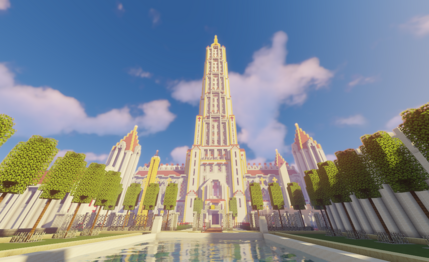
The White Gold Tower, also known as The WGT, the Ivory Tower or simply The Tower, is one of the oldest and most important buildings in Minecraftia. The world's largest building in terms of volume, it functions as the cultural, economic and political heart of the Kythiran Empire.
History
Originally the White-Gold Tower was a much simpler stone cathedral created by King Hurdræber during the middle of the Second Era. It was the largest construction project of the Kingdom of Helmsdeep, and ever since its creation has been the largest building in the world.
It was used to worship Lucifer, with the primary focus of the Helmsdeep crown being to reject the old gods of the First Era. During the Great Grief, the Helmsdeep King Hurdræber had retreated into the building from the attacking Redstonian troops, and it was here where he ultimately fell when King Von Roterstein let his pack of war hounds tear the Helmsdeep king apart in the halls of the great building.
It survived the rest of the Great Grief and the Minecraftian Dark Ages without much damage, after which it became a part of the new city of Helmira.
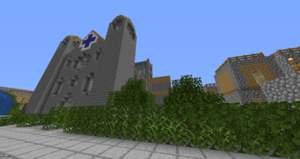
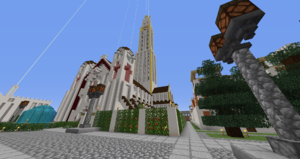
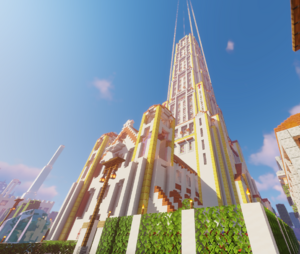
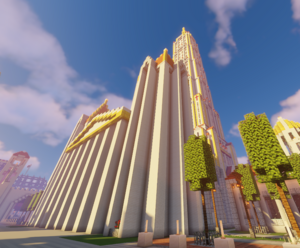
The White Gold Tower was originally simply known as De Kathedraal. When the Kythiran forces conquered the remains of Helmsdeep during the Imperial Unification after the Minecraftian Dark Ages, they occupied the building, giving it various purposes, from a munitions depot to a hospital for wounded soldiers returning from the front lines. When after the Unification the Empire was to be formally declared, the building was chosen as it was the largest in the world. For a while the Kythiran government was located in the Imperial Palace, the old summer palace from the Second Era, situated opposite of the WGT. Eventually this building proved too small for government functions, and a building was sought with a hall large enough to become the new imperial throne room. After the first renovations were completed, the building was renamed The King's Keep. It was here where the first peace treaty between the Kythiran Empire and the Imperius Reich was signed, and this was thus the namesake of that treaty.
During the late Third Era, the ageing Emperor demanded that the tower, which reached 44 meters, would be expanded. This resulted in a grand tower of white quartz with gilded lining reaching 181 meters tall, formally known as the Second Tower. Due to this expansion, the name of the building was changed yet again, officially becoming the White Gold Tower.
The Second Tower however was destroyed when it collapsed in an extremely stormy night during the late Third Era. It was replaced by a shorter but wider Third Tower, standing at 155 meters tall. During the late Fourth Era, just before the Reforma Carta, the tower and indeed the entire building saw their biggest expansion. The Third Tower was replaced by a massive new Fourth Tower, standing at 257 meters tall, making it the tallest building in history. The entire building was preserved and covered in a new outer area, in order to make the dimensions of the Fourth Tower fit better with the rest of the building.
Ever since the Third Era, the WGT has served as the seat of the imperial Kythiran government.
The modern WGT
Today the WGT functions, as it has since the Third Era, as the seat of government of the imperial Kythiran crown. Its primary function is to be the throne room of the Empire, but the Tower itself hosts a large reception hall known as the Sky Hall, numerous offices for important officials including the Grand Marshal, the Imperial Chancellor and the State Secretaries. It further hosts a restaurant known as La Tour, and the Empress has a private penthouse. In the golden-glass "dome" at the very top of the tower sits the office for the Empress herself, with 360 degrees views of Helmira.
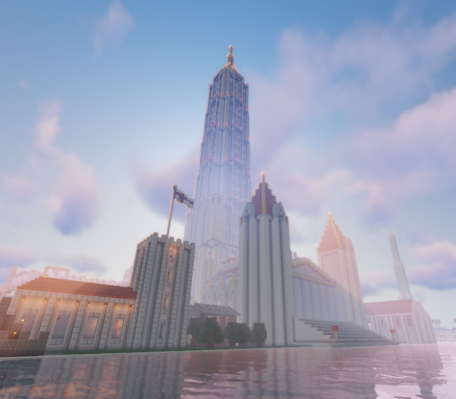
Trivia
- Bone is incorporated into several facets, such as the Senate floor. The official narrative is that these bones are from the fallen military foes of the Empire, but both the lack of large-scale battles in which the Empire has been involved in, as well as the fact that the original natives of Minecraftia, the Villagers, have mostly disappeared, would sketch a different origin.
- The central tower was originally much smaller. However, Emperor Viromaro insisted on expanding it under international protest, including from the Crown Prince himself. It is unknown if, upon accession to the throne, the Crown Prince will shorten the central tower to its original size.
- The Old Dungeons, nowadays open as part of the historic tour, once housed, though never at the same time, several particularly important international figures, including the Crown Prince of Kythira, Corporal Dervich of Imperius and the Grand Marshal of Imperius.
- It is a public secret that the White Gold Tower is connected to several separate locations through secret underground tunnels and escape routes.
- The White Gold Tower and the Imperial Palace are both connected through grand underground hallways, allowing for safe transport of royalty to and from the Tower.
- The White Gold Tower is the start and end point of the yearly commemoration of the Great Grief.
- In the Throne Room stands a statue in memory of the Great Chicken Incident. This event occurred during the Third Era, and involved the hall being flooded by thousands of chickens.
- Although having Tower in its name, none of the building's three towers are accessible to the general public.
- It houses the Minecraftia's largest indoor swimming pool, with room for small model ships, constructed for the amusement of the Emperor and his guests.
- The walls of the Throne Room were once adorned by large maps of Kythira's major cities, but these have been taken down in the Fourth Era.
- The Tower is accessible through the Kythiran Metro System, as well as a one-way metro from the Mercenary Bank to the Tower.
Above Ground:
The Memorial Gardens
Consists of the lush gardens, where the nations of the Second Era are remembered. There are stairs that lead down to a burial chamber located under the Throne Room.
The Throne room
The Throne room is a massive decorative hall, which is focused on the Diamond Throne, the seat of power in Kythira. Two small statues commemorate the Great Grief and the Chicken Incident. Two massive staircases lead down to the underground portions of the White-Gold Tower.
The Tower of the Crown Prince
The Tower of the Crown Prince is a 32 meter tall tower and a place within the palace for the Crown Prince to work. It consists of a small lobby, an office for his secretary, and his own office.
The Tower of Hand
The Tower of the Hand is a 32 meter tall tower and the place of work and residency for the Hand of the Emperor, a position currently in the hands of the commander of the Kythiran Legion. It consists of a bedroom and an office.
The White-Gold Tower
The Palace's most recognizable feature. Towering above the city of Helmira, this tower of white quartz and pure gold, houses offices for the Crown, namely the Emperor, the Crown Prince, the Grand Marshal and the Chancellor, as well as offices for five State Secretaries.
The tower was changed several times throughout its existence. The original tower, made by the finest craftsmen of the Kingdom of Helmsdeep during the Second Era, reached 44 meters tall, making it already at its time one of the tallest buildings in the world. During the Third and early Fourth Era, the tower was expanded to 181 meters. However, in the middle of the Fourth Era, this tower was replaced with a shorter but broader tower, standing at 155 meters tall. During the Fifth Era, the tower went through its most significant expansion since the beginning of the Third Era, with the tower reaching a total of 257 meters tall, making it by far the tallest man-made object in the world, and making the modern day Tower over five times taller than the original.
Below Ground
The Great Hall
The Great Hall is the central underground room, which connects all portions of the complex.
The Imperial Theatre
The Imperial Theatre is seats 108 people, plus the Crown Prince and Emperor, totaling 110 seats. It is the most important theatre in Kythira, and is primarily used to display plays about the battles between the Kingdoms of Kythira and Helmsdeep during the Second Era. Sometimes it is used for Ardoraghi Operas.
The Imperial Library
The largest library in the world, housing all known literary works and treaties.
The Hotel Voyage
The Hotel Voyage is the most luxurious hotel in Kythira, consisting of a large lobby, grand restaurant with 56 seats, or 14 tables, and live music, 24 rooms and 2 grand suites, indoor flower gardens made by the finest garden architects in Kythira, indoor pool with sauna and a lecture / conference hall that can be hired.
The Imperial Trade District
The center for Kythiran trade.
The Imperial Metro
Connecting the White-Gold Tower with the Kythiran metro system.
The Imperial Offices
Houses the logistical bureaucratic operations of the Kythiran Empire, and includes the following:
- The Emperor's Office
- The Hall of Kings
- 15 smaller offices
The Imperial Courthouse
The center of Kythiran Justice, including a courtroom, entrance to the Nether for banishment, and 28 jail cells with room for 56 prisoners. Due to this, the White-Gold Tower is Kythira's largest recognized prison.
The Imperial Museum
The Imperial Museum is used to display the history of Minecraftia, and, among others, houses the following:
The Hall of Heroes
Statues of all important people whom have lived in Minecraftia
The Hall of Support
Statues of all who have protected Minecraftia against the Doom of Darkness
The Small Hall
The Small Hall is a secondary hall that connects the top floor with the secondary parts of the complex.
Hall of Seas
The Hall of Seas is a showcase of the primary ships of the Kythiran Empire.
The Small Theater
The Small Theater is a theater for smaller shows or speeches, primarily reserved for second-class citizens.
The Hall of Peace
The Hall of Peace is a hall where the Kythiran Provinces, the Kythiran Crown and dignitaries from the Imperius Reich can meet. A notable feature of this hall is a grand window in the ceiling, which is located at the bottom of the Bay of Splendour, in between the White-Gold Tower and the Imperial Palace.
The Hall of the Provincial Council
The Hall of the Provincial Council is an advisory body of the Kythiran government. It holds seats for representatives of both Golden Provinces and Crown Provinces, as well as a secondary Diamond Throne for the Emperor. Each province also has its own private apartments, where its representatives can rest or discuss matters privately.
The Ardoragh Library
The Ardoragh Library is a dedicated library, used to store books from the Golden Province of Ardoragh, with a special focus on the book series 'The Book'.
The Kythiran Portal Hub
The Kythiran Portal Hub is a principal place for teleportation between dimensions.
The Hall of History
A display of several curated replicas and original structures from Minecraftia's history, including a recreation of the First House, based on the ruins in Oldspawn.
The Treaty Hall
Hall meant for signing treaties and the display of new and old treaties, a tribute to diplomacy.
The Senate Hall
A massive grand hall which houses the Kythiran Senate. It also gives access to the following rooms:
The Hall of Provinces
A small hall made primarily of wood, for the High Lords of Kythira to discuss issues among themselves and with the Emperor directly.
The Kythiran War Council
A grand hall, with a floor made primarily of crushed bones. Two giant diamond swords with skulls below them, as well as a golden sword on the ceiling, remind those who enter about the nature of the Council.
